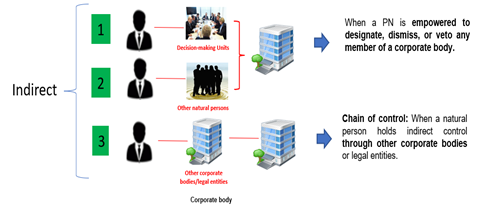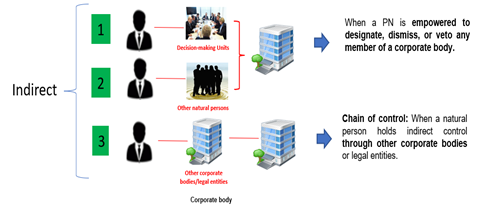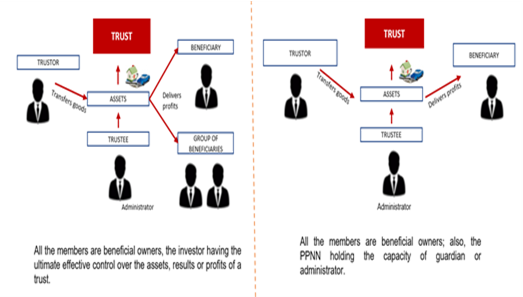05. Criteria for the determination of the beneficial owner
Criteria for the determination of the Beneficial Owner in Legal Persons
a) The individual that directly or indirectly, through any acquisition method, owns at least 10% of the capital of a legal person is considered as Beneficial Owner.
Therefore, legal persons shall inform about the beneficial owners indicating the shareholding percentages, as well as, if applicable, information related to the chain of ownership in cases in which it concerns an indirect beneficial owner, that is, it holds an indirect ownership through other legal persons.

In order to determine the indirect ownership, Section 5 of the Supreme Decree 003-2019-EF establishes the following assumptions:
- Individual who owns through relatives, spouse or the other common law partner, if applicable a shareholding of 10%.
- The indirect ownership of a legal person is the ownership held by means of other legal persons over which the first one has a minimum shareholding of 10%, as well as the indirect ownership that the latter have, in turn, through other legal persons provided that they also have a minimum shareholding of 10%.
- It is also considered that there is an indirect ownership when indirect ownership is exercised through a mandate without representation according to Section 1809 et seq. of the Civil Code, as well as through a mandate or any other legal act for which powers are granted under similar conditions based of foreign legislation.

b)We consider as beneficial owner the individual that acting individually or with others as a decision-making unit (direct) or through other individuals, legal persons or legal arrangements (indirectly), holds powers by means other than ownership to designate or withdraw the majority of Administrative Governing Bodies, management or supervision, or holds decision-making powers on financial, operating and/or commercial agreements adopted or exerting another type of control on the legal persons.
When appropriate, based on the direct control assumption, it will be necessary to include information related to the chain of control.
It is worth mentioning that direct and indirect control definitions are established in paragraph 5.4 of Section 5 of Supreme Decree 003-2019-EF.
- Direct Control: When individuals have more than one half of the voting rights in management bodies or Board of Directors or related having decision-making power on a legal person.

- Indirect Control: When an individual is empowered to designate, resign or oppose the majority of member of management bodies or board of directors or a legal entity equivalent, as appropriate, to have the majority of the votes in the meeting of such boards; thus, approving the financial, operating and/or commercial decisions or being responsible for strategic decisions in the legal persons, including decisions on achieving the objective and continuity.

c) When it is not possible to identify any individual under the criterion established in the former assumptions, the individual holding the Senior administrative position shall be considered as beneficial owner.
We understand as “senior administrative position”, the General Management or managements or the Board of Directors or the body or area in charge of the functional or management structure of any legal person.
It is worth mentioning that in the case of governing bodies or bodies with more than one member or position, each member will be considered as beneficial owner.
Legal Basis: Paragraph 4.1 of Section 4 of Legislative Decree 1372 and Section 5 of Supreme Decree 003-2019-EF

Criteria for the determination of the Beneficial Owner in Legal Arrangements:
What does Legal Arrangement mean?
- Independent equities managed by third parties that lack of legal status.
- Contracts and other agreements permitted by current regulations in which two or more persons, temporarily associated, have common rights or interest to carry out a specific activity without incorporating a legal person. There are included in this category:
- Investment funds, mutual funds for investment in securities, trust assets domiciled in Peru or
- Trusts or trust assets established abroad with administrator or protector domiciled in Peru, and
- Consortia, among others.
Legal Basis: Item d) in paragraph 3.1 of Section 3 of Legislative Decree 1372.
a) In the case of trusts or investment funds, individuals holding the status of settlor, trustee, fiduciary, beneficiary or group of beneficiaries and any other individual acting as participant or investors have ultimate effective control on equity or rights on results or profits in a trust or investment funds, as appropriate.
It is considered as “Ultimate effective control” to the controlling and continuous influence in decision making by the management or governmental bodies of the legal arrangements. In the case of trusts, if beneficial owners have not been appointed, the individual for the benefit of whom it has been created or any individual who ultimately exercises control of the trust, whether through direct or indirect control, is considered as the beneficial owner thereof.
b) In other types of legal arrangements, the individual holding a similar or equivalent position above mentioned in a) and in the case of the established trust, based on foreign law sources; also, the individual holding the capacity of protector or administrator.
Legal Basis: Paragraph 4.2 of Section 4 of Legislative Decree 1372 and Section 6 of Supreme Decree 003-2019-EF

 International Taxation
International Taxation